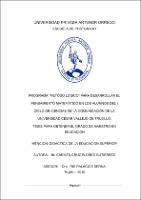Programa “Método lógico“ para desarrollar el pensamiento matemático en los alumnos del I ciclo de Ciencias de la Comunicación de la Universidad Cesar Vallejo de Trujillo

Ver/
Descargar
(application/pdf: 2.336Mb)
(application/pdf: 2.336Mb)
Fecha
2015Autor(es)
Flores Gutiérrez, Carmen Cruz
Metadatos
Mostrar el registro completo del ítemResumen
El pensamiento matemático permite analizar, interpretar, comparar,
fundamentar, generalizar los conocimientos para el aprendizaje que es
fundamental en la formación integral y profesional. Desde esta perspectiva
esta investigación busca desarrollar el pensamiento matemático a través del
programa “Método Lógico” en los alumnos del I ciclo de la escuela de
Ciencia de la Comunicación de la Universidad César Vallejo de Trujillo. Para
ello se elaboró un programa con ocho sesiones de aprendizaje para ser
aplicada en el aula durante dos meses. Este aprendizaje fue dividido en
cuatro dimensiones que son: analizar, interpretar, fundamentar y
generalizar. En esta experiencia se ha utilizado el diseño Cuasi
Experimental de dos grupos (grupo experimental y grupo control) con
aplicación de pre y post test. Los puntajes obtenidos fueron procesados
estadísticamente empleando las fórmulas de la Prueba de Hipótesis T de
Student para muestras relacionadas e independientes. Los resultados de la
prueba T de Student para muestras relacionadas, indicaron que la media del
post test en el grupo experimental fue de 13,34, siendo superior a la obtenida
en su pre test de 7,31 tanto en las cuatro dimensiones como en el
aprendizaje global; en el grupo control también la prueba T de Student
evidenció los mismos resultados; pero la Prueba T para muestras
independientes, indicó que la media (13,34) del post test del grupo
experimental, en las cuatro dimensiones y en el aprendizaje global, era
superior a la media (11,53) obtenida en el post test del grupo control. Por
tanto, se concluye que, si bien es cierto, en ambos grupos hay un aumento
de puntaje en sus medias, los alumnos del grupo experimental, que
recibieron clases con el Programa “Método Lógico” obtuvieron medias
superiores a las del grupo control. Mathematical thinking allows analyze, interpret, compare, justify and
generalize the knowledge for the learning process, which is essential in
comprehensive and vocational training. From this perspective, this research
seeks to develop the mathematical thinking through the ““logical method““
program in the first cycle students from the Communication Science School
at Cesar Vallejo’s University from Trujillo city. To get that, it was elaborated
a program with eight training sessions to be applied in a classroom for about
two months. This learning was divided into four dimensions they are:
analyze, interpret, justify and generalize. In this process it has been used a
quasi-experimental design of two groups (experimental and control group)
with pre and post test application. The scores obtained were processed
statistically using the formulas of the Student’s T-test hypothesis for
independent and related samples. The results of the Student T-test for
related samples indicated that the average post test in the experimental
group was 13,34 which is higher than the one obtained in the pre test of 7,31,
in both the four dimensions and in the global learning; in the control group
after using the Student's t-test showed the same results; but the T-test for
independent samples indicated that the average (13,34) of the post test
experimental group, in the four dimensions and global learning, was higher
than the average (11,53) obtained in the post test from the control group.
Therefore, we conclude that, if it is true, in both groups there is an increase
in their average score, students from the experimental group, which received
classes with the ““Logical Method““ program scored higher than the control
group averages.

